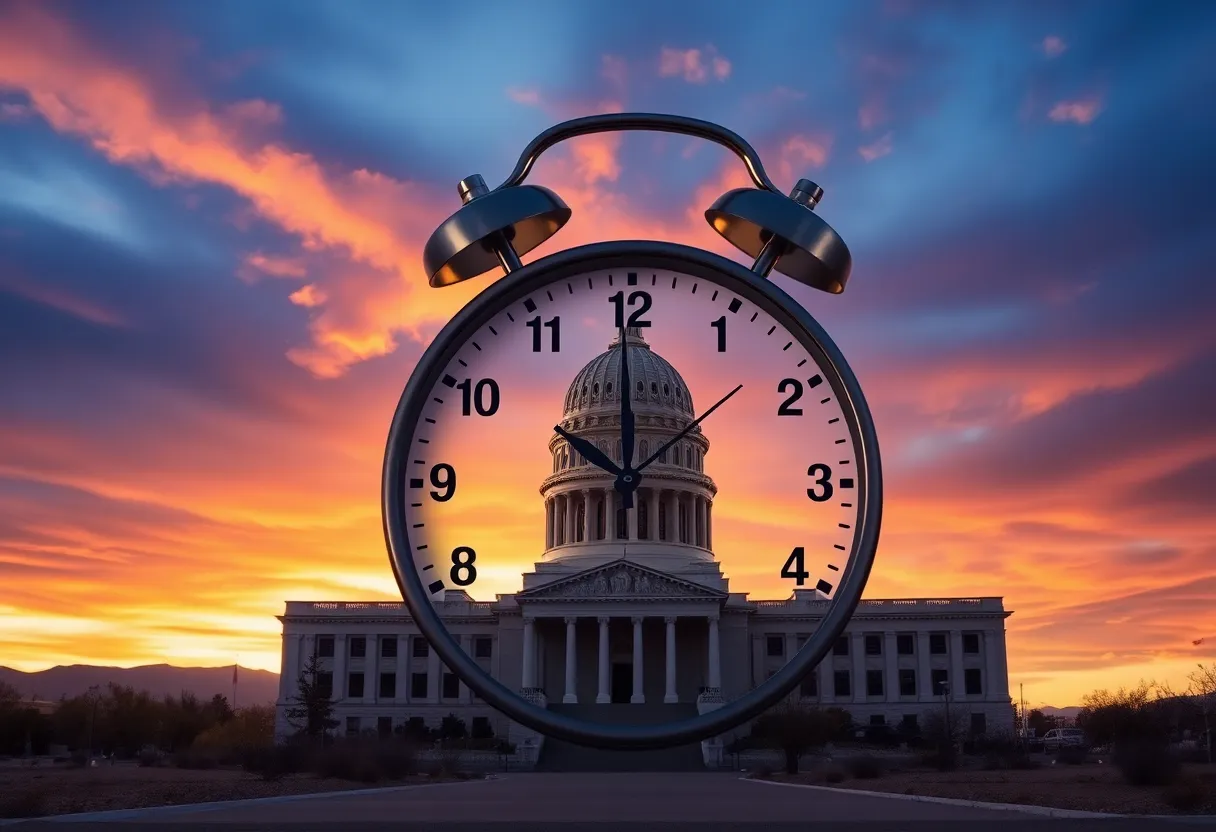News Summary
Arizona is on the verge of its first-ever government shutdown as the fiscal year-end approaches, with Governor Hobbs vetoing budget proposals from the Republican-controlled House. These vetoes risk halting essential state services, including healthcare and public safety, unless a new budget is approved by July 1. The ongoing political stalemate highlights the urgent need for bipartisan cooperation to address the state’s financial challenges.
Arizona Nears First-Ever Government Shutdown Amid Budget Crisis
Arizona is on the brink of its first government shutdown as the end of the fiscal year approaches on June 30, 2025. Governor Katie Hobbs has vetoed two budget proposals put forth by the Republican-controlled House, raising concerns about the state’s financial operations and services should a budget not be approved in time.
The vetoes occurred on June 25, 2025, just days before the deadline. Governor Hobbs stated that the proposals from the Arizona House did not meet her standards for funding essential services and supporting public safety. Without a budget in place, Arizona risks halting various government operations, which would have widespread implications for state services, including healthcare, public safety, and emergency response.
Impacts of Veto and Legislative Debates
The rejected House proposals were previously approved by the Republican-controlled Senate. However, Governor Hobbs deemed the plans unacceptable due to their potential to undermine public safety, healthcare for residents, and tax relief for small businesses. In her view, significant changes are necessary to address issues such as veterans’ homelessness and ensuring access to childcare.
In response to the vetoes, House Speaker Steve Montenegro expressed disappointment, asserting that the House had responded to the budgetary needs of the state by proposing balanced budgets aimed at maintaining essential services and preventing a shutdown. Montenegro noted that the House also passed a continuation budget to extend current funding levels but faced potential veto threats from the governor on this front as well.
Further complicating matters, House Republicans halted budget negotiations weeks ago, which led to the Senate and Governor Hobbs collaborating on a bipartisan $17.6 billion budget agreement without input from the House. This decision has attracted criticism from Senate President Warren Petersen, who argued that House Republicans’ political strategies have hindered progress and emphasized the necessity for bipartisan cooperation in achieving a viable budget.
Potential Consequences of a Government Shutdown
If the Arizona legislature fails to approve a budget by July 1, various government services could be delayed or suspended. While essential services such as emergency response may continue, uncertainty looms regarding the effects on other state operations, including those within state prisons and law enforcement. The exact impact of a shutdown remains unclear, but it could heavily disrupt various functions that residents rely upon.
The budget crisis in Arizona reflects a growing tension between legislative parties and has raised alarms about funding important community services. Governor Hobbs has repeatedly called for collaborative efforts among lawmakers to create a consensus-driven budget, warning that partisan approaches risk not only the fiscal health of the state but also the welfare of its residents.
Conclusion
With the clock ticking toward the June 30 budget deadline, Arizona is facing unprecedented challenges as a government shutdown looms, fueled by partisan disputes over fiscal priorities. The ongoing political stalemate highlights the critical need for compromise and effective governance in addressing the state’s financial obligations.
Deeper Dive: News & Info About This Topic
- KTAR News: Arizona Budget Senate House
- Wikipedia: Arizona Politics
- Arizona Mirror: Hobbs Vetoes Budgets
- Encyclopedia Britannica: Arizona
- Fox 10 Phoenix: Hobbs Vetoes Budget Bills
- Google Search: Arizona Government Shutdown
- AZ Family: Arizona Leaders Brace for Shutdown
- Google News: Arizona Budget Crisis

Author: STAFF HERE PHOENIX WRITER
The PHOENIX STAFF WRITER represents the experienced team at HEREPhoenix.com, your go-to source for actionable local news and information in Phoenix, Maricopa County, and beyond. Specializing in "news you can use," we cover essential topics like product reviews for personal and business needs, local business directories, politics, real estate trends, neighborhood insights, and state news affecting the area—with deep expertise drawn from years of dedicated reporting and strong community input, including local press releases and business updates. We deliver top reporting on high-value events such as the Waste Management Phoenix Open, Cactus League Spring Training, and Arizona State Fair. Our coverage extends to key organizations like the Greater Phoenix Chamber of Commerce and Visit Phoenix, plus leading businesses in technology and healthcare that power the local economy such as Intel and Banner Health. As part of the broader HERE network, including HERETucson.com, we provide comprehensive, credible insights into Arizona's dynamic landscape.





